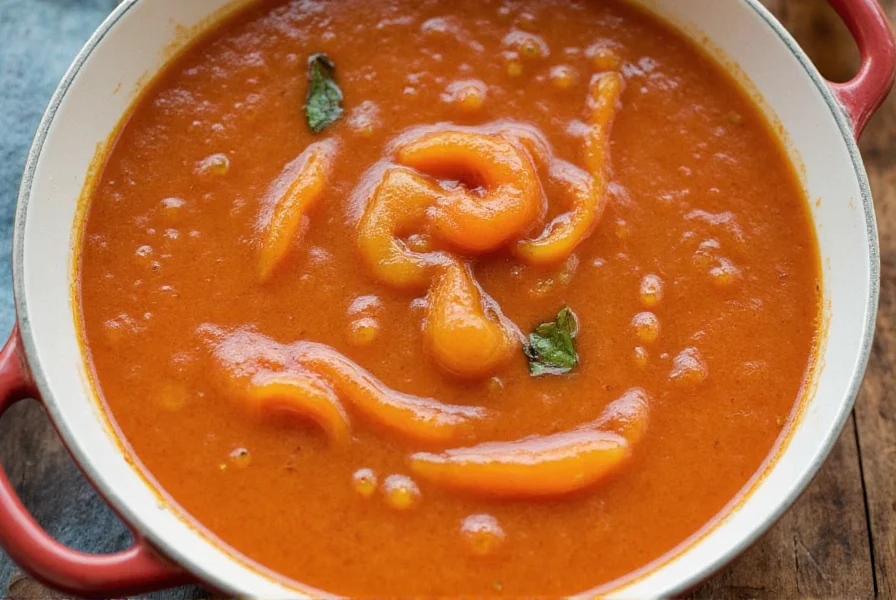Creating authentic jalapeño pepper sauce at home takes just 20 minutes with basic ingredients you likely already have. Unlike store-bought versions filled with preservatives, this fresh preparation delivers vibrant flavor and customizable heat. Whether you're a beginner cook or seasoned chef, this easy homemade jalapeño sauce recipe provides restaurant-quality results with minimal effort.
Essential Ingredients for Perfect Jalapeño Sauce
The magic of this authentic jalapeño hot sauce ingredients list lies in its simplicity. Quality matters most with just five core components:
- 8-10 fresh jalapeño peppers (stems removed)
- 3 cloves garlic, peeled
- 1 cup white vinegar or apple cider vinegar
- 1 teaspoon sea salt (adjust to taste)
- 1 tablespoon olive oil
For those wondering how to make jalapeño pepper sauce from scratch with variations, consider these optional additions:
- 1 roasted red bell pepper for sweetness
- 1 teaspoon cumin for smokiness
- 1 tablespoon honey for balance
- 1 lime, juiced for brightness
Step-by-Step Preparation Guide
Follow these precise instructions for the best jalapeño pepper sauce:
- Wash jalapeños thoroughly and remove stems. For milder sauce, remove seeds and white membranes.
- Heat olive oil in a saucepan over medium heat. Add jalapeños and garlic, sautéing for 3-4 minutes until slightly softened.
- Pour in vinegar and salt, bringing mixture to a gentle boil.
- Reduce heat and simmer for 15 minutes until peppers are tender.
- Allow to cool slightly, then transfer to blender.
- Blend until completely smooth (1-2 minutes).
- Strain through fine mesh sieve for ultra-smooth texture (optional).
- Pour into sterilized glass bottle and cool completely before sealing.
| Heat Level | Preparation Method | Resulting Flavor Profile |
|---|---|---|
| Mild | Remove all seeds and membranes | Subtle heat, fresh pepper flavor |
| Medium | Keep half the seeds | Balanced heat with tangy notes |
| Hot | Keep all seeds and membranes | Intense heat with complex depth |
Safety Tips for Handling Hot Peppers
When preparing your jalapeño pepper sauce recipe, protect yourself from capsaicin burns:
- Wear disposable gloves during preparation
- Avoid touching your face, especially eyes
- Wash hands thoroughly with soap after handling
- Use separate cutting boards for peppers
- Work in a well-ventilated area to avoid fumes
Storage and Shelf Life
Properly storing homemade jalapeño sauce ensures maximum freshness and safety:
- Refrigerate in airtight container for up to 3 weeks
- For longer storage, freeze in ice cube trays then transfer to freezer bags (up to 6 months)
- Always use clean utensils when serving to prevent contamination
- Check for mold or off smells before using stored sauce
Versatile Usage Ideas
This best jalapeño pepper sauce for tacos works beautifully across many dishes:
- Drizzle over breakfast eggs or migas
- Blend into mayonnaise for spicy dipping sauce
- Marinate chicken or shrimp before grilling
- Mix with sour cream for quick dip
- Add to Bloody Mary cocktails
- Stir into soups and stews for depth
Troubleshooting Common Issues
Encountering problems with your jalapeño sauce recipe? Try these solutions:
- Too spicy: Add more vinegar or a touch of honey to balance heat
- Too thin: Simmer longer to reduce liquid content
- Not flavorful enough: Add additional garlic or let sauce sit 24 hours for flavors to meld
- Separation: Shake well before use or add 1/4 teaspoon xanthan gum while blending
Perfect Pairings for Your Homemade Sauce
Discover the best jalapeño pepper sauce applications with these pairing suggestions:
- Mexican dishes: Tacos, enchiladas, quesadillas
- Breakfast: Huevos rancheros, breakfast burritos
- Appetizers: Queso fundido, nachos, stuffed jalapeños
- Proteins: Grilled chicken, fish tacos, carne asada
Frequently Asked Questions
How long does homemade jalapeño sauce last in the refrigerator?
Properly stored in an airtight container, homemade jalapeño pepper sauce maintains freshness for 3-4 weeks in the refrigerator. Always use clean utensils when serving to prevent contamination. For optimal flavor, consume within 2 weeks.
Can I use canned jalapeños instead of fresh for this recipe?
While fresh jalapeños produce the brightest flavor, you can substitute canned jalapeños in a pinch. Use 1 cup of drained canned jalapeños plus 1/4 cup of their liquid instead of fresh peppers and vinegar. Note that canned versions will have a slightly different, more vinegary flavor profile.
Why did my jalapeño sauce separate after storage?
Separation occurs naturally in homemade sauces without emulsifiers. Simply shake or stir vigorously before use. For a more stable emulsion, blend in 1/4 teaspoon xanthan gum during the final blending step, or add a tablespoon of olive oil while blending to help bind the ingredients.
How can I safely adjust the heat level in my jalapeño sauce?
Control heat by managing seed content: for mild sauce, remove all seeds and white membranes; for medium heat, keep half the seeds; for maximum heat, include all seeds. You can also balance heat by adding sweet elements like roasted bell peppers or a touch of honey after blending.
Is it necessary to cook jalapeño sauce, or can I make it raw?
Cooking develops deeper flavor and ensures food safety. Raw versions (pico de gallo style) exist but have shorter shelf life. The brief cooking process in this recipe preserves fresh pepper flavor while creating a shelf-stable product. Never skip the vinegar, as it provides necessary acidity for safe preservation.











 浙公网安备
33010002000092号
浙公网安备
33010002000092号 浙B2-20120091-4
浙B2-20120091-4